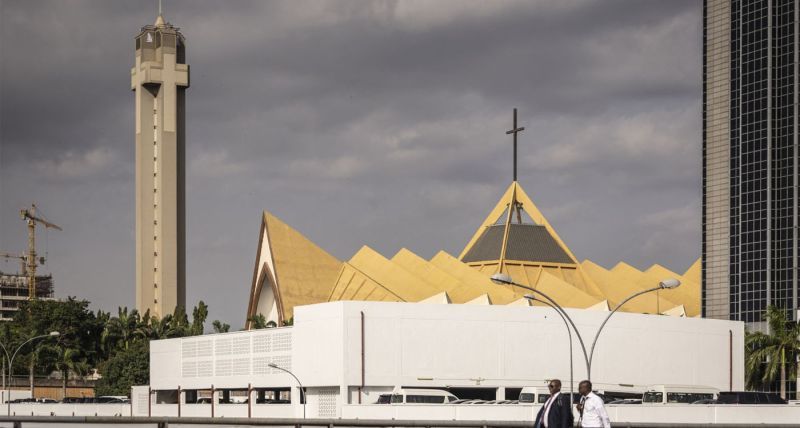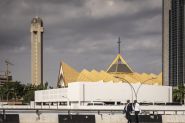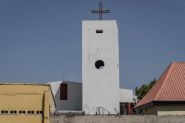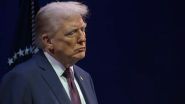- Home
- Middle East
- The Ordeal of Nigeria’s Christians

Abuja, Nigeria ©Olympia de Maismont / AFP
Donald Trump has renewed international attention on the tragedy facing Christians in Nigeria. In a fiery post published Sunday on Truth Social, the U.S. president threatened a “swift and brutal” military intervention if Abuja did not put an end to the massacres of Christians, accusing the Nigerian government of “failing to protect religious freedom.”
In response, Washington has placed Nigeria back on the list of countries of particular concern for religious liberties, alongside China and Pakistan. President Bola Ahmed Tinubu, for his part, denounced what he called an “unfair caricature,” insisting that his country “protects citizens of all faiths.”
A Country Gripped by Widespread Violence
The U.S. warning comes amid a surge of violence in Nigeria. This year, several deadly attacks have reignited sectarian tensions in the country’s central region.
In June, more than a hundred people were killed in the predominantly Christian village of Yelwata, in Benue State, when assailants, believed to be Fulani militias, set fire to dozens of homes and executed residents—including children—before disappearing into the surrounding bushland.
In October, the Christian Association of Nigeria (CAN) urged the international community to launch an independent investigation into the “systematic killings of Christians in the north and central regions of the country,” describing them as “atrocities.”
In early November, Abuja strongly rejected the American accusations of “religious persecution,” asserting that the violence affected Christians and Muslims alike and was primarily driven by land disputes and criminal activity.
These recent tragedies are part of a spiral of violence that has been unfolding for several years. According to Human Rights Watch, 2024 has seen a surge in kidnappings, armed raids, and communal clashes, particularly in the North-West and Central states.
The clashes between Christian farmers and Muslim herders, driven by decreasing farmland and growing competition for cultivable land, have taken the form of a latent sectarian war.
At Christmas 2023, more than 140 people were slaughtered in Plateau State, a predominantly Christian region in central Nigeria, in attacks attributed to Fulani herder militias. A few weeks later, around thirty civilians were killed in further assaults on the neighboring region of Mangu.
The jihadist group Boko Haram and the Islamic State in West Africa (ISWAP), active for more than fifteen years in the North-East, have carried out attacks that add to this wave of violence.
In February 2024, around 200 internally displaced persons were abducted in the Ngala district of Borno State, in the country’s north-east, while in September of the same year, 170 villagers were executed in Yobe State, also in the north-east, in an attack attributed to ISWAP.
The jihadist group Ansaru, a splinter faction of Boko Haram, continued carrying out kidnappings in the country’s central region, notably in Kuchi, in the north, in May 2024.
Targeted Persecution
Behind this endemic insecurity, Christians remain the primary victims. The organization Open Doors, which monitors religious persecution worldwide, ranks Nigeria as the deadliest country for believers, even surpassing Afghanistan and North Korea.
Entire villages are set ablaze, churches destroyed, and worshippers killed or forced to flee. In December 2023, attacks claimed nearly 300 lives, and eight churches were burned. Survivors, often women and children, take refuge in camps for the displaced, where misery and discrimination prevail.
In twelve northern states governed by Sharia law, Christians live as second-class citizens. Converts from Islam face the death penalty, while authorities turn a blind eye to violence committed in the name of religion.
In some areas, Christian schools were even closed during Ramadan by order of local authorities, in violation of the secular principles enshrined in the Constitution.
The Key Role of Fulani Militias
Currently, the most urgent threat comes from armed Fulani herder militias, particularly active in the “Middle Belt,” the pivot zone between the Muslim North and Christian South.
According to the Hudson Institute, these groups have killed thousands of Christian farmers in Benue, Kaduna, and Plateau states. Their attacks, often carried out under cries of “Allahu Akbar,” seem aimed at driving Christian communities off fertile land to assert territorial control. Millions of farmers have been displaced, making the region the epicenter of a severe humanitarian and food crisis.
The federal government, accused of inaction, denies any religious motivation, framing the violence as a simple conflict over grazing land, worsened by climate change. Local churches reject this interpretation, viewing it instead as part of a broader strategy for the gradual Islamization of the country.
The Nigerian Catholic Church has repeatedly urged Abuja to take action, but its calls have gone unanswered.
Abuja’s Inaction and Community Weariness
Reports from Human Rights Watch and the McCain Institute point to a shared conclusion: security forces have largely remained passive in response to warnings from local communities. In numerous documented cases, the police or military failed to respond to distress calls before or during attacks.
Religious leaders speak of total impunity: neither the masterminds nor the perpetrators of the massacres face justice. Even worse, some kidnapped priests or pastors are later found dead, as in the case of Father Sylvester Okechukwu in March, without any serious investigation being launched.
Camps for the displaced, mostly inhabited by Christians, have proliferated across the Central and North-East states. Living conditions are devastating, with severe shortages of water, healthcare, and education.
At this stage, Nigerian Christians remain caught between the hammer of fanaticism and the anvil of state indifference. Behind the statistics, the very survival of religious pluralism at the heart of Africa is at stake. In a country meant to embody diversity, simply believing has increasingly become an act of resistance.
Read more




Comments